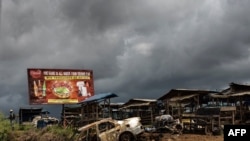Cameroonian and Nigerian authorities have agreed to jointly fight armed separatists in both countries. The nations' top security and government officials announced the deal during an emergency security meeting that ended Thursday in Nigeria's capital, Abuja. The meeting was convened after Anglophone separatists in Cameroon and the Indigenous People of Biafra in Nigeria said they would join forces to fight for independence.
Babagana Monguno, national security adviser to Nigerian President Mohammadu Buhari, said Thursday secessionist groups are uniting to destabilize Cameroon and Nigeria. The retired major general spoke at the end of the eighth session of the Cameroon-Nigeria transborder meeting in Nigeria's capital, Abuja.
Monguno said the neighboring countries will jointly combat the rebels operating within their borders.
"President Muhammadu Buhari reassures you [Cameroon] that Nigeria's territory will never be used by any group of secessionists to destabilize another friendly sovereign country. In addition, we would work closely together to ensure that any real or perceived attempt to form any alliances between secessionist groups in Nigeria and Cameroon are decisively dealt with," Monguno said.
Speaking on Cameroonian state radio, CRTV, Monguno said Nigeria will continue to support the efforts of Cameroonian authorities to stop the separatist crisis in Cameroon’s English-speaking western regions. The United Nations says at least 3,000 people have been killed and 550,000 civilians displaced in Cameroon and in Nigeria by the separatist crisis that escalated into an armed conflict in 2017.
Governors from the Nigerian states that border Cameroon and Cameroonian regions bordering Nigeria also took part in the Abuja meeting.
Territorial Administration Minister Paul Atanga Nji led Cameroon’s delegation. Nji said militaries of the two countries are already at work to map out ways of stopping separatists operating in Cameroon and in Nigeria. He said the two countries have decided to provide jobs and improve the livelihoods of people in border areas. He said poverty is driving many civilians to join separatist groups in pursuit of food and better living conditions.
"To eradicate transborder insecurity in all its forms or, I believe, to reduce it to minimum, our security forces must intensify intelligence gathering and information sharing. It must include measures to check religious radicalism, foster education and promote economic and social development projects along our common border," he said.
Nji said Cameroon is sincerely grateful for Buhari’s permanent commitment never to allow any part of Nigerian territory to serve as a safe haven for terrorists and separatist groups against its neighbor, Cameroon.
This week's Cameroonian-Nigerian security meeting is the first since Cameroon’s English-speaking separatists said they were partnering with the Indigenous People of Biafra, a group that wants a breakaway state in southeast Nigeria.
Capo Daniel, deputy defense chief of the Ambazonia Defense Forces, a rebel group in Cameroon’s English-speaking North-West and South-West regions, said the Ambazonia Defense Forces and Indigenous People of Biafra are determined to foster an alliance the Nigerian and Cameroonian separatist groups created in April.
"The alliance generates solidarity between the military wing of the IPOB, that is the Eastern Security Network and the Ambazonia Defense Forces. We will continue to intensify the collaboration in areas such as operating training camps, exchanges in military trainers, open exchange of weapons and military personnel, as well as sharing intelligence across the border," Daniel said.
The Indigenous People of Biafra has not issued a statement on the terms of their collaboration with the Ambazonia Defense Forces. Videos shared on social media platforms such as Facebook and WhatsApp, though, appear to show people claiming to be officials of the rebel groups meeting. Cameroon and Nigeria say rebel and secessionist groups from the two countries have been meeting and trafficking in weapons.
Nigeria shares a 1,975-kilometer border with Cameroon. Militaries of the two countries have been jointly fighting violent crises since 2010. Nigeria’s northeastern states of Borno and Adamawa and Cameroon's Far North region on Nigeria’s border report regular Boko Haram terrorist attacks.
Cameroon says separatists use porous borders to import weapons through Nigeria and collaboration between the Ambazonia Defense Forces and Indigenous People of Biafra is making the security situation very uncertain.
Other security challenges include conflicts over illegal exploitation of natural resources, highway robbery, drug and human trafficking, illicit trafficking of firearms, and agricultural conflicts.
The Cameroon-Nigeria Transborder Security Committee was created in 2012 in Nigeria to strengthen security in both countries.




